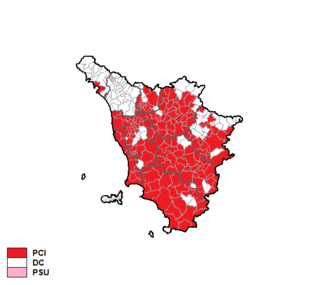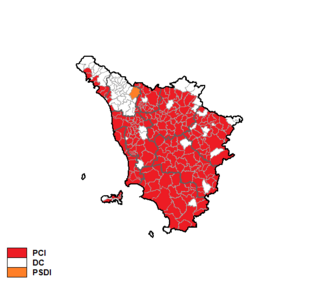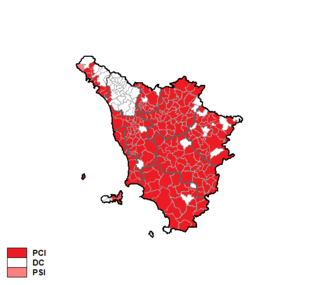| | ||||||||||||||||||||||||||||||||||||||
| ||||||||||||||||||||||||||||||||||||||
All 50 seats to the Regional Council of Tuscany | ||||||||||||||||||||||||||||||||||||||
| ||||||||||||||||||||||||||||||||||||||
The Tuscan regional election of 1980 took place on 8 June 1980.
| | ||||||||||||||||||||||||||||||||||||||
| ||||||||||||||||||||||||||||||||||||||
All 50 seats to the Regional Council of Tuscany | ||||||||||||||||||||||||||||||||||||||
| ||||||||||||||||||||||||||||||||||||||
The Tuscan regional election of 1980 took place on 8 June 1980.
Election was held under proportional representation with provincial constituencies where the largest remainder method with a Droop quota was used. To ensure more proportionality, remained votes and seats were transferred at regional level and calculated at-large.
The Italian Communist Party was by far the largest party. After the election Mario Leone (Italian Socialist Party), the incumbent President of the Region, formed a new government with the Italian Communist Party.
In 1983 a government crisis occurred as the relationship between the Communists and the Socialists had become tense at the national level. Communist Gianfranco Bartolini formed a one-party government and then a new coalition government with the Proletarian Unity Party. [1]
 | ||||
| Parties | votes | votes (%) | seats | |
|---|---|---|---|---|
| Italian Communist Party | 1,159,489 | 46.5 | 25 | |
| Christian Democracy | 715,747 | 28.7 | 15 | |
| Italian Socialist Party | 293,090 | 11.8 | 5 | |
| Italian Social Movement | 92,243 | 3.7 | 1 | |
| Italian Democratic Socialist Party | 77,729 | 3.1 | 1 | |
| Italian Republican Party | 71,089 | 2.9 | 1 | |
| Italian Liberal Party | 32,002 | 1.3 | 1 | |
| Proletarian Unity Party | 27,012 | 1.1 | 1 | |
| Proletarian Democracy | 26,621 | 1.1 | - | |
| Democratic Party – List for Trieste | 221 | 0.0 | - | |
| Total | 2,495,243 | 100.0 | 50 | |
Source: Ministry of the Interior

The 1968 Italian general election was held in Italy on 19 May 1968. The Christian Democracy (DC) remained stable around 38% of the votes. They were marked by a victory of the Communist Party (PCI) passing from 25% of 1963 to c. 30% at the Senate, where it presented jointly with the new Italian Socialist Party of Proletarian Unity (PSIUP), which included members of Socialist Party (PSI) which disagreed the latter's alliance with DC. PSIUP gained c. 4.5% at the Chamber. The Socialist Party and the Democratic Socialist Party (PSDI) presented together as the Unified PSI–PSDI, but gained c. 15%, far less than the sum of what the two parties had obtained separately in 1963.

The 1972 Italian general election was held in Italy on 7 May 1972. The Christian Democracy (DC) remained stable with around 38% of the votes, as did the Communist Party (PCI) which obtained the same 27% it had in 1968. The Socialist Party (PSI) continued in its decline, reducing to less than 10%. The largest increase in vote share was that of the post-fascist Italian Social Movement, which nearly doubled its votes from 4.5% to about 9%, after its leader Giorgio Almirante launched the formula of the National Right, proposing his party as the sole group of the Italian right wing. After a disappointing result of less than 2%, against the 4.5% of 1968, the Italian Socialist Party of Proletarian Unity was disbanded; a majority of its members joined the PCI.

The 1976 Italian general election was held in Italy on 20 June 1976. It was the first election after the voting age was lowered to 18.

The 1979 Italian general election was held in Italy on 3 June 1979. This election was called just a week before the European vote: the failure to hold the two elections at the same time caused much criticism for wasting public money.

The 1983 Italian general election was held in Italy on 26 June 1983. The Pentaparty formula, the governative alliance between five centrist parties, caused unexpected problems to Christian Democracy. The alliance was fixed and universal, extended both to the national government and to the local administrations. Considering that the election result did no longer depend on the strength of the DC, but the strength of the entire Pentapartito, centrist electors began to look at the Christian Democratic vote as not necessary to prevent a Communist success. Moreover, voting for one of the four minor parties of the alliance was seen as a form of moderate protest against the government without giving advantages to the PCI. Other minor effects of this election were a reduction of the referendarian Radical Party and the appearance of some regional forces.

The 1987 Italian general election was held in Italy on 14–15 June 1987. This election was the first Italian election in which the distance between the Christian Democrats and the Communists grew significantly instead of decreasing. Two parties that had not previously been in parliament won representation: the Greens with thirteen seats, and the Northern League with two.

The 1992 Italian general election was held on 5 and 6 April 1992. They were the first without the traditionally second most important political force in Italian politics, the Italian Communist Party (PCI), which had been disbanded in 1991. Most of its members split between the more democratic-socialist oriented Democratic Party of the Left (PDS), while a minority who did not want to renounce the communist tradition became the Communist Refoundation Party (PRC); however, between them they gained around 4% less than what the already declining PCI had obtained in the 1987 Italian general election, despite PRC absorbing the disbanded Proletarian Democracy (DP).

The Alliance of Progressives was a left-wing political alliance of parties in Italy formed in 1994, with relevant predecessors at local level in 1993. The leader of the alliance was Achille Occhetto. The alliance was a predecessor of the modern-day centre-left coalition.

The 1995 Lombard regional election took place on 23 April 1995. The 6th term of the Regional Council was chosen.

The Ligurian regional election of 1980 took place on 8 June 1980.

The Tuscan regional election of 1970 took place on 7–8 June 1970. It was the first-ever regional election.

The Tuscan regional election of 1975 took place on 15 June 1975.

Tuscan regional election of 1985 took place on 12 May 1985.

The Tuscan regional election of 1990 took place on 6 and 7 May 1990.

The 1955 Sicilian regional election took place on 5 June 1955.

The 1959 Sicilian regional election took place on 7 June 1959.

The 1964 Friuli-Venezia Giulia regional election took place on 10 May 1964. It was the first election ever. Proportional representation was used.

The Italian regional elections of 1980 were held on 8 and 9 June. The fifteen ordinary regions, created in 1970, elected their third assemblies.

The Italian regional elections of 1985 were held on 12 and 13 May. The fifteen ordinary regions, created in 1970, elected their fourth assemblies.
Democratic elections have been held in Naples, Italy, since the collapse of Benito Mussolini's fascist regime. Today, all residents of Naples who are at least 18 years old and hold an EU citizenship are eligible to vote for the mayor and the 48 members of the city council. They also vote for the president and the 30 or 40 members of the municipal council in which they reside.